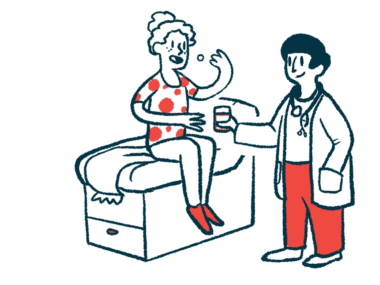How My Spouse and Caregiver Views Myasthenia Gravis
After a decade, he's learned that 'Caregiving is hard' — and different for men
Written by |

Can you believe we’re in the last week of November? To close out National Family Caregivers Month, I thought it might be fitting to hear from my caregiver, as I’ve written enough columns putting words in his mouth. I wanted to give him the opportunity to share his unique voice with y’all.
So without further ado, following is what my husband, Justin, has to say, in writing, about being a caregiver to a wife with complex medical needs, including myasthenia gravis (MG).
SB: What was your first experience with caregiving, and how did it make you feel?
JB: I remember watching my mother and grandmother take care of my great-grandmother in her final days. Back then, I was in my early 20s and had no comprehension of the stress and fatigue caring for another can create.
Not fatigue from the work itself, though there’s that, too. No, the mental and emotional fatigue that come with it. The “did I remember to do.” The “I need to get X, Y, and Z done in W time because their health and safety depends on it.”
This is not even to mention the fear that comes from the possibility of losing someone you’re close with or the fear that no one seems to discuss, that you’re somehow holding them back from pursuits of living their best life because allowing them to chase dreams will mean more work, stress, and fatigue for you. Additional work, stress, and fatigue that you’re unsure you can handle.
How has being a caregiver for your wife affected you?
Caregiving is hard. Much harder than people think because so often those who do it make it look effortless. So much so, in fact, that when done well and on good days for the injured/ill, people may assume that the life you describe isn’t real and you’re trying to game the system, seek attention, or both. This is an especially “enjoyable” feeling to have if that person is someone who is or was once close to you.
What’s it like being a male caregiver?
I get glances at times when I tell people the position I’m in. I’m about 6 feet tall, 250 lbs., spend time in the gym as both a participant and a trainer as my job, and dress like an extra from “Yellowstone.” I’m an outlier.
Most in such a position are women. This isn’t me being sexist; the statistics bear it out. In the general population, more than 75% of caregivers are women. Within the VA [Veterans Affairs] caregiver system, post-9/11 statistics show that 91% of veteran caregivers are women.
Why does this matter? I’ve never talked to anyone about this any further than surface-level conversation. In a decade, I’ve never delved into my struggles, fears, etc., because frankly, I don’t know who to do it with. At this point, I’ve yet to even meet another man in my position. Some of this falls on me, of course. I say I’ve never interacted with someone similar, but I’ve also never sought it.
And while I wouldn’t discount the opinions and experiences of a female caregiver because that would display such significant ignorance I can’t even wrap my head around the idea, I also know I cannot connect fully because men and women process this stuff differently. That may not be popular to say in 2022, but it is the truth. There are differences in genders, and this is one of them. We don’t process things, especially emotions, the same way.
How do you balance being a caregiver and everything else?
I believe how we navigate our duties as caregivers matters. But caregiving is not ALL we are. We can still have hopes, dreams, and pursuits; doing so is necessary and vital to the care of our loved one. In order to be mentally fresh and able to do our best work, we MUST find time to decompress and give our brains and bodies time to rest. These things are not requests, but requirements for doing this job over long periods of time.
I’ve been doing this for a decade. This is the first time the seeds of burnout have entered the chat. It’s been an incredible (some good, some not so good) year that keeps going like it has Energizer batteries. But at this point, the year’s batteries are doing far better at keeping it going than mine are for me. This is the first time I’m acknowledging such, and I feel a mix of relief and shame.
People often talk of caregiving with a dismissive tone, not understanding what actually takes place within such a role. While I would never call someone out, next time you see or hear someone in such a position, please take a moment to consider what that person’s days are like.
Note: Myasthenia Gravis News is strictly a news and information website about the disease. It does not provide medical advice, diagnosis, or treatment. This content is not intended to be a substitute for professional medical advice, diagnosis, or treatment. Always seek the advice of your physician or other qualified health provider with any questions you may have regarding a medical condition. Never disregard professional medical advice or delay in seeking it because of something you have read on this website. The opinions expressed in this column are not those of Myasthenia Gravis News or its parent company, Bionews, and are intended to spark discussion about issues pertaining to myasthenia gravis.




Dolores Foster
I am so proud of you for taking the time, feeling your emotions and sharing your experience. I am sure you have many who have read this who relate and may not feel so alone and maybe able to allow themselves to feel and express their feelings. Thank you for sharing the real you!
Evan Hurtig
I would like to see an article about woman been the care giver for there husband. I am new to Mg. Im 48. I have had to go through hell for the last year as I have been cut off of WSIB Money and any other money I could get. I have had no energy for the last 2 years If I try to do anything that requires lifting much weight or doing for a walk my breathing gets tight and my voice quality goes.I could not talk much at all for the 1 part of the year and wsib got me voice therapy. once i get tired my voice goes. I have drop in the corner of my mouth. I have found out this has effected my right side. my eye quality has dropped as well as my hearing. I need a cane if I walk. as when i start to get tired my body stops working properly. my right hand does not go out like my left. to put it right out I feel life I'm pushing on weight or my hand will shake. I can not do a lot of what I like I to be able to. when I do push it and do a little more than I should I end up been flat on my bead fora few days. I also have sleep apnea, so I use a c-pap and when I feel bad and i have a hard time breathing the c-pap help. I see a Neurologist in a week now or so to get the severity of this figured out and how to move forward. Back to my original question and why im asking the question. My wife has had a hard time dealing with my situation and the fact I can't do as much as I used to be able to do her answer was to tell me she docent won't to be with me any longer. I need to move out. I spend a few days at my house and a few days at my parents. This news was the last thing I needed. out of no were I won't you out of my like. 2023 I will be married for 23 years. all my wife wonts is me gone no counselling just get out of my like. Blew me away.
Shawna Barnes
Evan - Thank you for sharing and confiding here. I am sorry to hear that you both are struggling. If she (or you) are on Facebook, there are several support groups for those with MG and I believe there are some specifically for the caregivers as well. There are several men in the groups that I am in and they may be a better resource for you and give you peers who can relate to what you're going through. Mark Harrington is also a writer for MG News (http://myastheniagravisnews.com/together-mark-harrington/). You may find additional resources in his articles. Sending you peace and comfort as you navigate this trying time. - Shawna
Doug
Shawna and Justin,
Thank you for taking the time to write this. Everything Justin stated, I can personally relate to, especially, no one to relate to the struggles and emotions, as my wife has MG and receives IVIG every three weeks. . I've never liked the words patient and caregiver, as I see us both depending on each other, so I wrote the below poem for my wife.
Doug
Our Life with Myasthenia Gravis
Some days are better than others, but we have one another.
When the challenges become great, we hold one another unyielding for survival.
It takes courage to fight the fight, it takes courage to ask for help, especially when you are the protector.
We always have each other, and together we are fused as one.
The outward appearance always seems normal, as if nothing is wrong.
What no one sees, except us, is the inside, where the fight and struggles live, for both the captive and protector.
Though our lives have changed, we work together, to ensure neither one is alone.
We always have each other, and together we are fused as one.
It takes more than courage to face the fight and struggles.
It takes compassion, empathy, and most of all, it takes knowing you aren't alone, even when you feel alone.
As the fight and struggles turn to raging storms, we remain unwaivered, as we are together.
We always have each other, and together we are fused as one.
When you try and describe it to others, it's undescribable, as it can’t always be seen.
There are many feelings, for both the captive and protector.
Some controlled, some not so controlled, some open for others to see, but many remain hidden, for only them to hold.
Both are reliant on one another for honesty, trust, and most of all, to pick the other up, when the fight and the struggles become an uncontrollable ragging storm.
Love Forever,
The Protector
by doug
may 2019
Copyright © 2019 Doug Harper
All rights reserved. No part of this may be copied, or reproduced by any means,
electronic or otherwise, without prior consent in writing from the copyright owner.
Email [email protected] for consent.
Shawna Barnes
Doug - thank you so much for sharing the poem you wrote for your wife. We tend to not place so much emphasis on the words, but sometimes it's just easier to use the terms "caregiver" to explain what he does many of his days. He is my caregiver through a program at the VA (I am a disabled Veteran). Justin and I depend on one another as well; there is definitely an ebb and flow. Thank you again for sharing! - Shawna